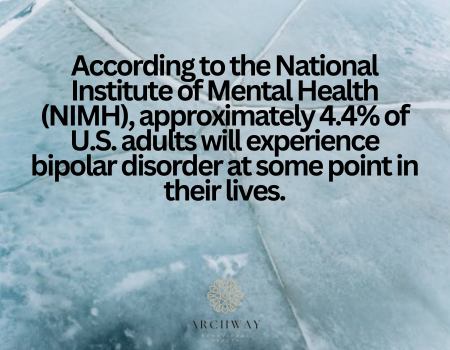Bipolar disorder is a complex mental health condition characterized by dramatic shifts in mood, energy levels, and behavior. These changes can disrupt daily life, relationships, and overall well-being, leaving individuals struggling to maintain stability. However, with the right support, it’s possible to manage bipolar disorder and lead a balanced, fulfilling life.
Living with bipolar disorder can feel like a rollercoaster of emotions, from the extreme highs of mania to the overwhelming lows of depression. However, with the right support system and treatment, it is possible to regain stability and lead a fulfilling life. Bipolar Treatment Programs offered by facilities like Archway Behavioral Health are designed to provide individuals with the tools and strategies needed to manage their condition effectively.
Understanding Bipolar Disorder
Bipolar disorder is understood as a condition consisting of massive mood swings and prolonged phases of anxiety and depression. While the symptoms can vary in intensity and duration, they often disrupt daily life and relationships. Seeking help from a mental health treatment center is a crucial step in finding relief and stability.
Common types of bipolar disorder include:
- Bipolar I Disorder: Characterized by intense manic episodes that may require hospitalization, often accompanied by depressive episodes.
- Bipolar II Disorder: Defined by less severe hypomanic episodes but more persistent and debilitating depressive episodes.
- Cyclothymic Disorder: Involves frequent mood fluctuations that are less intense but still disruptive over time.
Symptoms of Bipolar Disorder
Manic or Hypomanic Symptoms:
- Increased energy and activity levels.
- Impulsive or risky behaviors.
- Racing thoughts and rapid speech.
- Decreased need for sleep.
Depressive Symptoms:
- Persistent sadness or hopelessness.
- Fatigue and low energy.
- Difficulty concentrating.
- Thoughts of self-harm or suicide.
The Role of a Bipolar Treatment Program
A Bipolar Treatment Program is a comprehensive approach that combines various therapeutic techniques and support services to address the unique needs of individuals with bipolar disorder. These programs aim to:
- Stabilize mood fluctuations.
- Enhance coping skills.
- Improve interpersonal relationships.
- Build a sustainable plan for long-term recovery.
At Archway Behavioral Health, we provide a blend of evidence-based therapies and compassionate care to help our clients regain control over their lives.
How Bipolar Treatment Programs Can Help
Bipolar Treatment Programs are designed to provide individuals with the tools and resources they need to manage symptoms, reduce mood swings, and regain stability. A comprehensive approach combines therapy, medication, and support to address the emotional, behavioral, and social aspects of the condition.
1. Individualized Treatment Plans
A successful Bipolar Treatment Program begins with a thorough assessment of each person’s unique needs and challenges. Tailored treatment plans address the individual’s specific symptoms, triggers, and goals.
Benefits:
- Personalized care ensures the most effective strategies are implemented.
- Treatment plans evolve as progress is made, maintaining long-term stability.
2. Evidence-Based Therapies
Cognitive Behavioral Therapy (CBT):
CBT is a cornerstone of bipolar treatment, helping individuals identify and change negative thought patterns that contribute to mood swings.
How CBT Helps:
- Teaches practical coping skills to manage depressive and manic symptoms.
- Encourages individuals to recognize early signs of mood shifts.
- Provides tools to address stressors that can trigger episodes.
Dialectical Behavior Therapy (DBT):
DBT focuses on emotional regulation, making it particularly effective for individuals with intense mood fluctuations.
Key DBT Skills Include:
- Mindfulness: Staying present and aware of emotional changes.
- Distress Tolerance: Managing crises without resorting to harmful behaviors.
- Emotional Regulation: Balancing intense emotions during manic or depressive episodes.
3. One-on-One Therapy
One-on-One Therapy provides a private and personalized space for individuals to explore their experiences, challenges, and goals.
Key Benefits:
- Allows individuals to work closely with a therapist to identify triggers and develop strategies.
- Focuses on addressing underlying issues, such as trauma or relationship challenges.
- Builds a strong therapeutic relationship, fostering trust and progress.
4. Group Therapy Programs
Group Therapy Programs complement individual therapy by fostering connection and shared learning among participants.
Benefits of Group Therapy for Bipolar Disorder:
- Reduces feelings of isolation by connecting with others who understand the challenges of bipolar disorder.
- Encourages the exchange of coping strategies and mutual support.
- Provides a safe space to practice communication and relationship-building skills.
5. Medication Management
While therapy is critical, medication often plays a key role in stabilizing mood swings. Bipolar Treatment Programs provide access to psychiatrists who can:
- Prescribe mood stabilizers, antipsychotics, or antidepressants tailored to individual needs.
- Monitor and adjust medications as necessary to maintain balance.
6. Structured Support Through Comprehensive Programs
Partial Hospitalization Program (PHP):
A PHP offers intensive daily therapy while allowing individuals to return home in the evening. This structured approach is ideal for those needing consistent care without full hospitalization.
Features of PHP:
- Daily therapy sessions, including individual and group options.
- Skill-building workshops focused on emotional regulation and stress management.
- Psychiatric support for medication adjustments.
Intensive Outpatient Program (IOP):
An IOP provides flexibility for individuals balancing treatment with daily responsibilities.
Features of IOP:
- Therapy sessions multiple times a week.
- Focus on integrating coping strategies into real-life situations.
- Support from both therapists and peers.
Key Components of Effective Treatment Programs
1. Individualized Treatment Plans
Every individual experiences bipolar disorder differently. That’s why creating a personalized treatment plan is essential. Our team at Archway Behavioral Health works closely with clients to develop strategies tailored to their specific needs and goals.
2. One-on-One Therapy
One-on-One Therapy provides a safe space to explore emotions, identify triggers, and develop coping mechanisms. Therapies like Cognitive Behavioral Therapy (CBT) are particularly effective in helping individuals challenge negative thought patterns and replace them with healthier ones.
5. Comprehensive Support Services
A well-rounded mental health treatment center like Archway Behavioral Health also offers additional services, including medication management, family counseling, and holistic therapies, to address the full spectrum of an individual’s needs.
Why Choose a Mental Health Treatment Center for Bipolar Disorder?
A trusted mental health treatment center provides a comprehensive approach to managing bipolar disorder, offering access to a range of services and therapies.
Key Benefits of a Mental Health Treatment Center:
- Expert Care: Licensed therapists and psychiatrists specializing in bipolar disorder.
- Customized Plans: Personalized treatment plans tailored to individual needs.
- Holistic Services: Access to therapies like CBT, DBT, One-on-One Therapy, and Group Therapy Programs.
- Continuity of Care: Seamless transitions between levels of care, from PHP to outpatient therapy.
Steps to Begin Your Bipolar Treatment Journey
- Schedule an Assessment: Contact a mental health treatment center to evaluate your needs and determine the best level of care.
- Create a Treatment Plan: Work with a team of professionals to develop a plan tailored to your symptoms and goals.
- Engage in Therapy: Participate in evidence-based therapies, including CBT and DBT, to build effective coping strategies.
- Access Ongoing Support: Transition to outpatient therapy or support groups to maintain stability over the long term.
The Archway Behavioral Health Difference
At Archway Behavioral Health, it’s about empowering individuals to live their best lives. Here’s what sets us apart:
- Highly Skilled Team: Our staff includes psychiatrists, psychologists, social workers, and counselors who are dedicated to providing compassionate care.
- Respect and Dignity: Every person who walks through our doors is treated with the utmost respect and compassion. We listen to your experiences and collaborate with you to develop meaningful goals.
Why Seek Treatment?
Ignoring bipolar disorder can lead to a worsening of symptoms and significant disruptions in personal and professional life. Seeking help from a mental health treatment center not only provides access to expert care but also offers a structured environment to work towards recovery. A Bipolar Treatment Program is your first step toward regaining balance and achieving long-term stability.
Take the First Step with Archway Behavioral Health
If you or a loved one is struggling with bipolar disorder, Archway Behavioral Health is here to help. Our mental health treatment services are designed to provide comprehensive care in a supportive and professional environment. Whether it’s through One-on-One Therapy, Group Therapy Programs, or advanced therapeutic approaches like Dialectical Behavior Therapy, we are committed to helping you find stability and peace of mind.
Conclusion
Living with bipolar disorder can be challenging, but it doesn’t have to define your life. With the right treatment and support, stability and emotional balance are within reach. Bipolar Treatment Programs offered at a trusted mental health treatment center combine evidence-based therapies like Cognitive Behavioral Therapy (CBT), Dialectical Behavior Therapy (DBT), One-on-One Therapy, and Group Therapy Programs to provide comprehensive care.
If you or a loved one is ready to take the first step toward stability and recovery, don’t wait to seek help. A tailored Bipolar Treatment Program can provide the tools and resources you need to regain control and live a fulfilling life. Call us today at 888.488.4103 to start your journey to stability and wellness.
Frequently Asked Questions (FAQ)
What is a Bipolar Treatment Program?
A Bipolar Treatment Program is a comprehensive approach to managing bipolar disorder, combining therapies like Cognitive Behavioral Therapy (CBT), Dialectical Behavior Therapy (DBT), medication management, and personalized care plans to stabilize mood and improve well-being.
How does Cognitive Behavioral Therapy (CBT) help with bipolar disorder?
CBT helps individuals identify and challenge negative thought patterns, develop coping strategies, and recognize early signs of mood shifts to prevent episodes.
What role does Dialectical Behavior Therapy (DBT) play in bipolar treatment?
DBT focuses on emotional regulation and distress tolerance, helping individuals manage intense emotions and reduce impulsive behaviors during manic or depressive episodes.
What is the difference between One-on-One Therapy and Group Therapy?
- One-on-One Therapy provides a private, personalized space to explore individual challenges and goals with a licensed therapist.
- Group Therapy fosters connection and shared learning by providing a supportive environment to interact with others facing similar challenges.
What medications are used to treat bipolar disorder?
Common medications include mood stabilizers, antipsychotics, and antidepressants. A psychiatrist at a mental health treatment center can assess and prescribe the best options based on individual needs.
What is a Partial Hospitalization Program (PHP) for bipolar treatment?
A PHP offers structured, intensive care during the day, including therapy and skill-building sessions, while allowing individuals to return home in the evenings.
How does an Intensive Outpatient Program (IOP) differ from a PHP?
An IOP provides therapy sessions several times a week, offering flexibility for individuals balancing treatment with daily responsibilities, whereas PHP involves daily, full-day sessions.
Can bipolar disorder be treated without medication?
While therapy and lifestyle changes play a significant role, medication is often necessary to stabilize mood swings effectively. Treatment plans are tailored to each individual’s needs.



